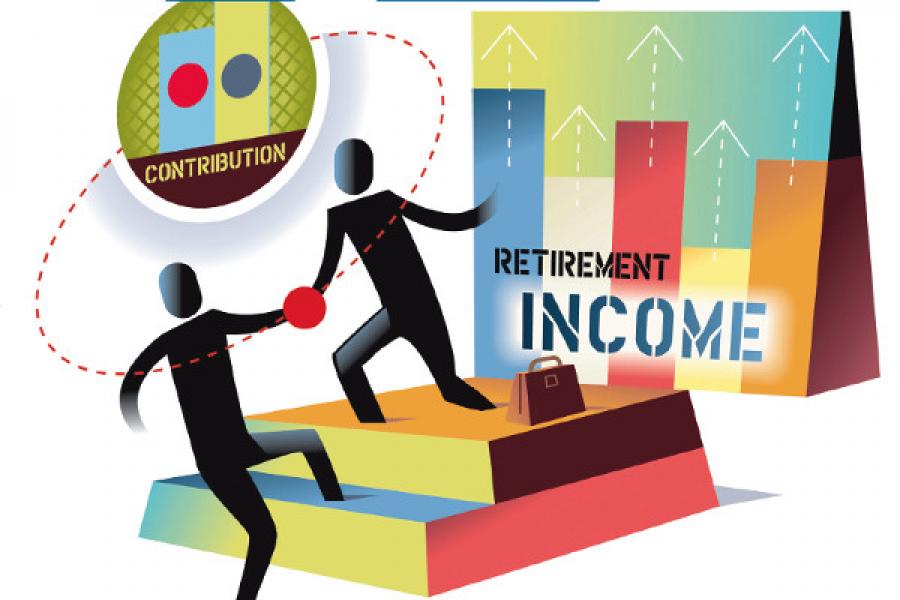Yes, this will probably be my last post and I want to use this opportunity to summarise what I have learnt during the last few years researching retirement income. However, sometime in the next few months, I intend to publish a downloadable booklet of my retirement research and recommendations.
My aim when I started this blog was to use it as a route to designing my ideal retirement income strategy. Writing about a topic demands careful thought and detailed research, and publishing the conclusions opens the analysis to public scrutiny which should result in a far more unbiased and critical analysis.
There was a certain irony in that although I had managed the accumulation phase of retirement investing well, with careful monitoring of my progress, changing my target portfolio value taking into account the rate of inflation and my own income needs and of course my target retirement age, I had given little thought as to how I would use my pension pot to produce income.
Of course, I had made rough assumptions during the years of saving referencing annuity rates and in latter years applying the 4% rule. I had however given little thought to the merits of annuities, total return drawdown, and retiring on dividends”. Nor had I given thought to preparing my investments to minimise my tax liability and having spent much time overseas I had a substantial part of my investments outside of tax efficient ISAs and SIPPs.
My eventual strategy involved simplification of my investment from over 6o different holdings of individual shares, Investment Trusts, and funds held between 5 platforms to have only 4 holdings on two platforms resulting in three income streams:
-
-
-
-
-
-
- UK State Pension
- Level Annuities
- Total Return Drawdown
-
-
-
-
-
Lessons Learned
- Accumulation is easy – It might not seem so easy at the time but saving for retirement is not complicated. It might require some sacrifices and self-discipline but success can be as easy as just going with one global index fund and investing as much as one can afford via low-cost tax efficient SIPPs and ISAs. Closer to retirement there are decisions to be made about de-risking by adding bonds to the portfolio but the worst that can happen is you don`t save enough so have to choose between delaying retirement, taking part-time work or a side hustle or just having a leaner retirement.
- Deacumulation in Complicated – if you get it wrong you outlive your savings which is what every retiree fears. Generating income in retirement, needs planning. There are multiple options each one of which has its pluses and minuses and no adviser can say that there is an ideal strategy for any given retiree. So decisions have to be made and whilst no strategy guarantees success careful planning can minimize the chance of failure.
- Try and Diversify – here I am not referring to the cliche for investment of “diversification is the only free lunch” but to the importance of trying to have several different income streams, which are independent of each other such as State Pension, Annuities, Defined Benefit Pensions, Total Return Drawdown, Dividend Income and Rental Income.
- Simplify – the fewer decisions one has to make to manage investments the less chance there is of making mistakes due to cognitive decline and the simpler it will be should you have to hand over management of your investments to family or professionals.
- Automate – the ideal is to have a regular income without having to do anything. Easy with the State Pension, Annuities, even Dividend Income. Less easy with drawdown but there are platforms such as Vanguard that will automate the process – you specify the monthly income and they sell the necessary funds in a specific ration to generate the cash.
- Take Professional Advice – Most retirees don’t need a financial adviser to run their investments. But help with deciding upon an overall straegy might be useful. These are also occasional events such as the sale of an investment property, or inheritance planning where one-off professional advice could be essential. Wills and inheritance planning in particular are areas where nowadays with the prevalence of blended families the failure to plan well can lead to unwelcome consequences.
- Fund Managers Don`t beat The Indices. At least in the long term. Yes active funds can sometimes outperform their reference index over maybe 10 years or more. Sometimes this is by skill but often it’s because their particular style just lucks in with market conditions. Even Warren Buffett accepts that he can no longer beat the S&P 500.
- 4% of companies have produced all the market gains. Over the last 100 years, 4% of the S&P500 companies have produced all the gains and the remainder have averaged returns equal to US Treasury Bills. Your only chance of owning that 4% is to own the whole market via a total market index fund.
- Stick to Your Plans – Ignore The Noise. There are two reasons why private investor doesn`t achieve the theoretical returns from their investments. Fund fees and platform fees are one reason. The other is not sticking to the course, panicking when markets fall then buying when markets are booming and changing strategy due to social media noise.
- Analysing Gold is Difficult. Some well-known portfolios such as The Permanent Portfolio and The Golden Butterfly have a large component in gold and offer the low volatility that many retirees seek. The problem is that gold has only been free-floating since 1971 whereas bonds and equities have 100+ years of history. This is limited history compared to the 100+ years of the equity and bond markets so confidence in these portfolios must lower.
- Everything is Priced Into the Market Price. Often on social media, there are comments such as “with interest rates predicted to fall it should be a good time to buy bonds”, or “The stock market is at an all-time high so I`m going to sell”. These comments are nonsense and should be ignored. Market prices are the result of thousands of analysts, experts, computer simulations, and sophisticated algorithms. Everything that is known and forecasted is built into the price of a stock, bond, or currency. So if someone thinks they know better than the market good luck to them!
- Remember the cliche “it`s time in the market, not market timing”. To get market timing right not only do you need to know when to sell but when to buy back in. The probability of the professionals getting this right is very low, and it`s zero for the private investor.
- Total ReturnInvesting Will Provide Higher Long-Term Returns than Dividend Investing but Dividend Investing Can Fulfill Part of an Income Strategy. A company that is paying out a big chunk of its profits in dividends cannot grow as fast as a company that is reinvesting its profits for growth. This inevitably means that the total return from a sector paying high dividends will be lower than from a sector that reinvests a higher percentage of its profits. This doesn`t mean that the option of dividend investing should be completely ignored. A lower total return in exchange for lower volatility and a reliable income stream can be comforting to retirees and can provide some sequence of return protection.
- Think hard about your risk tolerance. Recently, driven by the FIRE movement there has been much support for the idea of having 100% equities backed up by a 2 to 3-year cash reserve. But remember, a 60/40 equity/bond portfolio is likely to fall by approximately 30% or so in a market crash. A 100% equity portfolio could fall by 60-70% and in the great Wall Street crash markets fell by 90%.
- Cash – how much cash you should hold depends completely on the structure of your retirement income and the often quoted “hold two to three years income in cash” is certainly not appropriate for all retirees. For instance, my drawdown portfolio has an equity holding and a bond holding and is held outside of a SIPP. If markets crash I will drawdown from my bond holding and avoid selling equities. Many retirees do not have this flexibility and may therefor wish to hold a large cash buffer. And of course there are many retirees who have a very high proportion of guaranteed income so are not so worried about the possibility of a market crash.
- Global Index Funds are not as diversified as some say but they are still the best choice for most. Much attention is now been given to the dominance of the “magnificent 7 companies” that dominate the S&P500 and global indices. Other indices are being developed such as equal weighted or capped weighted that attempt to address this issue. Whether these provide higher longer term returns is yet to be determined so at the moment the cap weighted index is still the best option for most investors.
- The 4% Rule is a Guide Only – 4% is probably a little on the high side for a UK retiree but the rule assumes that the retiree will ignore market performance and increase his expendi¡dure by the rate of inflation through retirement. Following the rule also means most retirees will die leaving a big inheritance – in other words, they under-spend. There are variable withdrawal strategies that help optimise withdrawal to meet the retiree’s spending and inheritance aims.
- Retirees Generally Don`t Spend Enough but retirees who have guaranteed income spend more and are happier. If you rely on income drawdown it is obvious that you will be cautious due to fear of being hit by a market crash, by super high inflation, of just living too long. Retirees who have a high level of guaranteed income have fewer such worries and it has been shown spend more.
Finally:-
Happiness in retirement is not determined by your income
Research shows that providing you have adequate income
that money is one of the less important factors in having a happy and fulfilling retirement.
Social interaction and having activities that give meaning to your life are more important for a happy retirement







Terrific list Max – thanks a lot for your posts over the years, I’ve learned a lot and come to pretty much the same conclusions.
Just discovered your website and I’m enjoying your analysis and conclusions. Good job sir. 🙂
You have made me pause and reflect. I have very much enjoyed and learnt a lot from your posts. Thanks.
I came across this site by accident when researching the Golden Butterfly Portfolio for UK and your website was referenced by ChatGPT. I really enjoy reading some of the articles here. Many great articles. Please continue to post when you can.
I do hope you are enjoying retirement. I am rapidly approaching mine and revisiting your website for a refresher is hopefully going to point me in the right direction. Thanks very much.